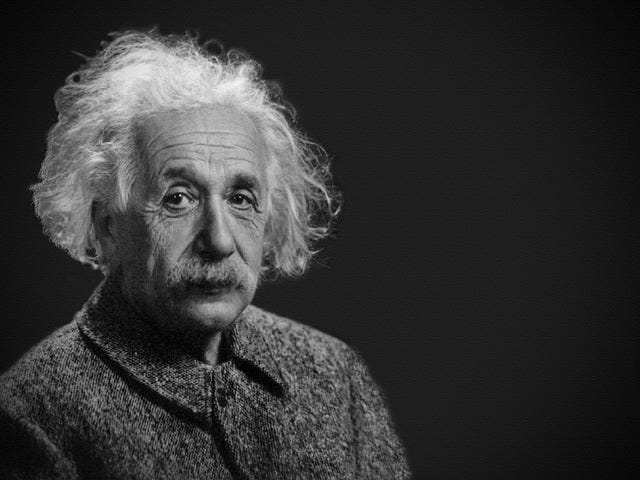What is intellect, and how do we use it?
Most of us are familiar with what I would call ‘Party Riddles’. The first one I remember hearing is, “What is black and white and red (read) all over?”
In contrast to party riddles, there is another type of riddle that can be very useful. Riddles of this type can function to frustrate and exhaust the mind, whereupon it may stop, or quiet down, and something new can emerge. In Zen Buddhism, they’re called Koans. The most famous of these is “We know the sound of two hands clapping. What is the sound of one hand clapping?”
I would venture to say that none of us has an answer to the question contained in that Koan. To our analytical minds, it seems completely nonsensical. “How can one hand clap?” Perhaps your mind has looked for an answer anyway. I know mine has...
Let’s inquire into this business of looking for answers. What happens within us when we encounter a question for which we have no answer, or a problem for which we have no solution? Our culture has trained us to think about the problem and bring all our previous experiences to bear.
What does it mean to think about the problem using our intellect? Generally, it means to use the mind to analyze a situation, examine possible remedies, and settle on the most likely solution. How do we do that?
What Is the mind, and how does it work?
One of my favorite philosophers, Werner Erhard, defined the mind as “a linear array of multi-sensory total records of successive moments of now.” He described the process by which one’s experience, which happens in the moment, is immediately turned into a memory, complete with all the information that was delivered by our five senses as well as whatever we were feeling in that instant, the meaning we ascribed to the experience, and so on.
We have an essentially infinite stack of these records. The topmost item in the stack is a complete, multisensory, multi-emotional record of the moment that just passed. And now, on top of that record, is another one. That’s the stack. It’s like one of those spring-loaded dish holders you might find in a restaurant. Put another dish on the stack, and that compresses the spring a little more.
Now, we can define the intellect as the process by which the mind pores through the stack looking for ‘earlier-similars’, records that resemble the current situation closely enough to be relevant as clues for how to proceed to solve whatever problem we face or grasp whatever concept we’re grappling with.
All of us have heard a voice in our ‘heads’ that talks to us all day along, describing what we’ve just experienced, what we’re likely to experience, and so on. Sometimes it argues with itself… I call that the internal dialog. For most of us, that voice is assumed to be our voice. Rene Descartes wrote in 1637, “I think, therefore I am.” We know ourselves as thinking beings, and thinking rationally is widely considered to be the best way to solve problems. Intellect is just shorthand for the ability to think rationally in order to find solutions.
Examples
I invite you to watch your intellect work on these problems:
How can I get out of this room? This is a question for which we DO have the answer… because we have records of previous successful (and perhaps unsuccessful) attempts to leave this room, or any room, and the mind has found enough of the positive results to show us how to do it. The analysis of the room you’re in now happens so fast it’s really hard to watch that analysis take place. Unless, of course, the door is disguised as something else, like a bookcase.
How can I get rid of the bear in the tree in my front yard? Here’s a question to which we have lots of answers… somebody told us, we read about it, it worked before (even if there were times when it didn’t). Spray the tree with vinegar or ammonia. Fill balloons with ammonia, slather them with peanut butter, and nail them to the tree. Spray with Pine-Sol. Put up an electric fence (that’s the one that worked best). ` And so on.
How about a question for which we have no answers – at least, in the intellect. I invite you to watch your mind try to solve these too.
· What is the Universe? Define the Universe for me…
· How can I live in “the here and now” all the time?
· What happens when I die?
Can you hear the voice in your head debating all this? Maybe it’s agreeing, or vociferously disagreeing, with all or part of the above.
What is intuition, and how can we use it to solve problems?
One of my heroes is Albert Einstein. He is quoted as saying that “We cannot solve our problems with the same thinking we used when we created them.” I would like to rephrase that and say, we cannot solve our problems with the same ideas we’ve been taught all our lives. Einstein came up with ideas nobody had ever had before. He examined the problems he faced, and he came up with a whole new class of solutions.
Where did those solutions come from? You could say that he invented them, made them up ‘out of whole cloth’, as they say. Or, you could say those solutions already existed, and Einstein was somehow able to access them. In any case, instead of relying exclusively on his intellect, which could only provide ideas that could be cobbled together out of all those ‘earlier-similars’ I spoke of, he found himself in possession of truly new ideas… or at least new for us humans.
But of course, Albert Einstein was himself a human being, just like the rest of us. While any one of us might not be able to master the mathematics he needed to quantify his ideas, I believe we are still able to access truly new ideas just as he did, though most likely on a more down-to-earth level! I call that ability intuition.
Extending that idea, the world’s problems that seem so unsolvable could then turn out merely to be products of our own limited vision. We need to find out how to access thoughts that are more powerful in their ability to explain what we observe. I like to believe that’s exactly what Einstein did when he stopped wracking his brain and allowed his intuition to take over.
To summarize, I think the Einstein example shows that there is a source of ideas that is independent of information gathering or even our human experience. His ideas were so different from what had come before that I feel like they must have come from somewhere else. I’ve come to see intuition as the ability to tap into that source of ideas. We could call it the ‘solutions field’. That field is invisible to us, and therefore hard to visualize. But then, the gravitational field is also invisible and hard to visualize, and yet we’re comfortable with how it works in our everyday lives.
The other Voice
Perhaps you have read this story before in my writings, but I believe it’s worth telling it again in this context. I was in my late twenties. I was driving by myself in a car in the middle of nowhere, a car that got terrible gas mileage. I had no credit card and no cell phone (this was a long time ago, after all). I began to think it likely that I wouldn’t have enough cash to get home. I didn’t know what to do if I were to run out of gas way out there. I was praying out loud, for the first time in my life, to whomever or whatever might be listening. I was really scared!
Suddenly, I clearly heard an authoritative Voice, from out of nowhere, that said, “Don’t worry Larry, we’ll get you home.” It wasn’t like a voice in my head… it was more like it came from everywhere, or that it filled all of space and contained me. I knew in that moment that conscious awareness doesn’t have to be encased in a body… it can be, let’s say, unembodied.
Hearing that Voice calmed me immediately, and through what I could call a miracle, I made it home. And that experience makes me want to offer others an opportunity to discover their own connection, what I call intuition, to that larger consciousness. And, perhaps, you’ll also have an opportunity to look beyond your current situations for whatever else might be possible for you.
If you want a detailed description of that long-ago experience, you can find it in my book, Hoodwinked: Exploring Our Culture’s Profound Illusions. It’s the subject of Chapter 7.
These days, whenever I observe my mind trying to solve some problem and I feel the anxiety of not having the solution, I practice bringing to the fore the knowledge that I am connected to Universal Intelligence and that It will arrange circumstances such that what I need to know will appear.
Intuition is available to all of us. Sometimes we call it listening to our gut, or to our heart. It’s a messaging system, and our culture has taught us to drown it out by relying on our intellect. But it’s worth paying attention to. I have learned that my intuition is worthy of my trust.








I like what you saying! It sort of reminds me of the book Zen and art of motorcycle maintenence!